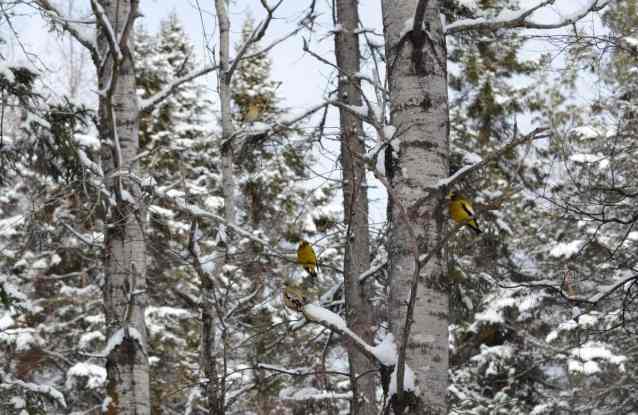Evening Grosbeaks In Algonquin Park

One of the highlights of our January visit to Algonquin Park was seeing a small flock of Evening Grosbeaks. What a marvelous way to spend my birthday, trekking about the trails in the Provincial Park. Our winter weather had been so fickle…fluctuating between spring-like temperatures and those more typical of the Canadian Arctic…that we had no idea what was in store for us when we booked our stay in Whitney.
Bob and I varied our activities over the course of 4 days and fitted in some cross-country skiing as well as snowshoeing. We made an effort to explore two new trails that we had never hiked or cycled before, and revisited a couple of familiar spots for some wildlife viewing.
It was at the entrance to the Spruce Bog Trail, almost directly opposite the Visitors’ Centre, that we found the boldly-patterned Evening Grosbeaks lined up like a welcoming party atop the trail sign.
There were so many Evening Grosbeaks that we could not get an exact count…at least a couple dozen flashing yellow through the thin forest of trees that ring the circular parking lot.
Evening Grosbeaks are finches similar in size to American Robins. They have plump, sturdy bodies and remarkable thick, cone-shaped bills well suited for cracking the seeds that make up a good share of the birds’ winter diet. Among those seeds favoured by Evening Grosbeaks are those of spruce, pine, and balsam fir trees.
Because visitors to the Spruce Bog Trail often leave behind a selection of wild bird food, the Evening Grosbeaks,
Canada Jays,
Blue Jays, and other birds hang around the walkway to snitch seeds from the wooden railing.
Evening Grosbeaks occupy habitat that includes thick coniferous forests, but these birds live only in North America. They breed in the northern forests of Canada although winter irruptions every few years see them moving in large numbers to areas further south in search of food.
A male Evening Grosbeak is quite spectacular to look at with its bright golden plumage and substantial yellow brow that gives the bird a stern countenance.
When viewed from behind, the male can readily be identified by the bold, pure white wing patches and a solid black tail.
The plumage of a female Evening Grosbeak is more subdued, white patches are visible in the folded wings, and the end of the tail is set off with large white spots.
Here, we see a male on the left and a female on the right. As Bob and I looked on, it was fascinating to note that the birds were breaking off short pieces of twigs, which had us questioning whether or not they were in the mode of nest building.
Further observation convinced us that the Evening Grosbeaks were eating the tender buds on the twigs, and in the process, the thin woody sprigs often would split in two.
With our winter having several extremely warm spells, the buds of new leaves were more swollen than usual for the time of year. Buds of several species of trees appeal to Evening Grosbeaks as part of their food source.
Any maple, oak, cherry, willow, aspen or elm buds will fit the bill, but these innovative birds will also break maple twigs in order to drink the sap. Maybe that is what these birds were up to.
It sure was delightful to come across so many of these birds all in one place, a typical behaviour since Evening Grosbeaks forage in flocks during the winter months, yet despite their numbers, the air was not filled with bird song. Though Evening Grosbeaks do vocalize with simple sweet piercing calls and burry chirps, they are not known to break out in a string of melodic notes that would constitute a song. Instead, our ears were met with the sigh of wind stirring in the trees and the whisper of wings stroking the chilly winter air.
You May Also Enjoy:
Snowshoeing the Spruce Bog Trail in Algonquin Park
A Black-backed Woodpecker in Algonquin Provincial Park
Pine Martens in Algonquin Park
Red foxes wintering in Algonquin Park






















Very nice pictures! I would love to see Evening Grosbeaks.
Their colors are very beautiful.
They are indeed a beautiful welcoming party.
I personally love winter over summer in Algonquin Park. Trails there in the winter are beautiful.
Thank you for your lovely comments. Bob and I find favour with all the seasons in Algonquin Park, but enjoying the solitude of the trails with fewer people around in the winter months is hard to beat.